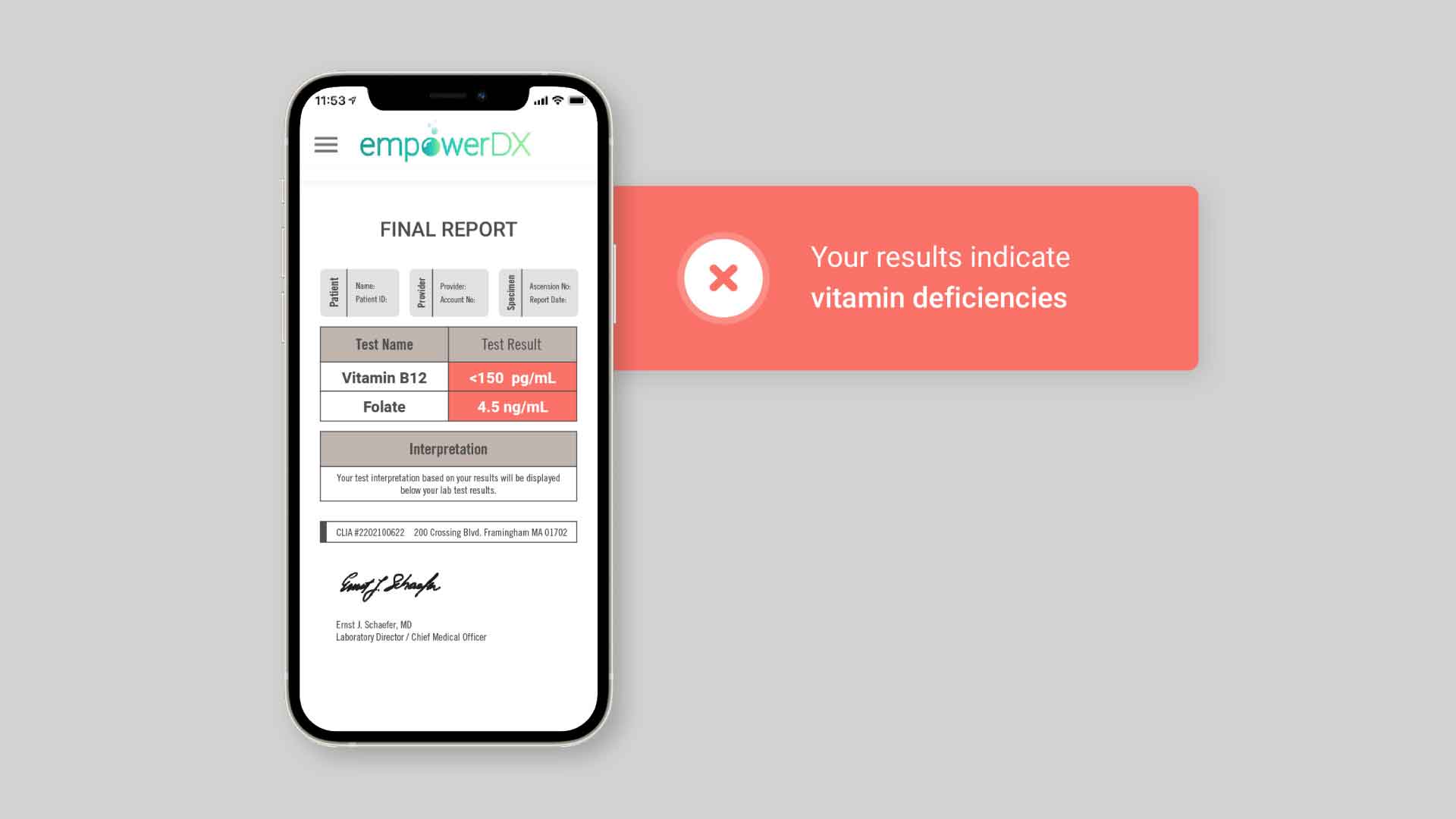It’s easy to forget about all the intricate processes going on just underneath your skin. Tiny nerves, hardworking red blood cells, and our DNA work together in a complex system to help keep your brain and body healthy.
But when you don’t have enough vitamin B12 to keep your body functioning, you can find yourself feeling dizzy, tired, and less than your best. And even if you load up your diet with vitamin B12-rich foods, certain medications, health conditions, and other lifestyle factors can make it difficult for your body to absorb and use this critical nutrient.
So what causes low vitamin B12 and poor absorption in your body? Is there anything you can do to escape the brain fog and get back to feeling like yourself again?

What is vitamin B12?
Vitamin B12 is a nutrient that keeps your blood cells and nerve cells healthy, along with helping your body make DNA. (If you’re looking for the fancy scientific name, it can also be called cobalamin.) Often, you’ll get most of your vitamin B12 through foods like fish, meat, eggs, and dairy. People following a vegetarian or vegan diet may need to eat foods that are fortified, meaning they have vitamin B12 added to them, in order to get enough vitamin B12 in their diet.
What are the symptoms of vitamin B12 deficiency?
If you don’t have enough vitamin B12, you may experience symptoms such as:
- Fatigue
- Weakness
- Low appetite
- Dizziness
- Problems with balance
- Struggling with memory
- Tingling or numbness in the hands and feet
- Easy bruising
If left untreated, vitamin B12 deficiency can result in permanent nerve damage and other serious health conditions. (Yikes.) That’s why it’s important to get tested for a vitamin B12 deficiency as soon as possible so you can take action.
However, even if you eat a vitamin B12-rich diet, there are certain health conditions, medications, and other factors that can prevent your body from properly absorbing B12 from the food you eat.
What health conditions prevent me from absorbing vitamin B12?
Pernicious anemia
If you can’t absorb vitamin B12 from the food you eat, you may have a condition called pernicious anemia. People with pernicious anemia lack a protein called intrinsic factor, which is essential for helping your body absorb vitamin B12. According to a 2012 article published in the Journal of Blood Medicine, pernicious anemia can account for anywhere between 20 to 50 percent of vitamin B12 deficiency in adults. [1]
Typically, this condition can be treated with injections of cyanocobalamin (another form of vitamin B12) or through oral supplementation of vitamin B12, according to a 2017 article published in the American Family Physician. [2]
Some research has found that a greater number of people who have autoimmune thyroid disease also have pernicious anemia, as noted in this 2006 study of 115 thyroid patients. [3] While we don’t yet know if one condition causes the other, it’s interesting to note the connection – and we’ll keep you updated on any other emerging research related to this topic.
Autoimmune disease and vitamin B12 deficiency
Several autoimmune conditions can be risk factors for low vitamin B12 levels, especially ones that involve the gastrointestinal system. This includes celiac disease, where gluten triggers the immune system to attack the small intestine. One small study of 39 people with untreated celiac disease found that vitamin B12 deficiency was present in 41 percent of the studied group. [4] This study found that their vitamin B12 levels got back to normal just by being on a gluten-free diet.
Vitamin B12 deficiency is also common in people with Crohn's disease, where the gastrointestinal tract is chronically inflamed. However, one small study of 94 people found that 94.7 percent of them were able to get their vitamin B12 to a normal level after taking oral vitamin B12 supplements.
Vitamin B12 and medications
Certain drugs can also negatively impact your body’s ability to absorb vitamin B12. Metformin, a common medication for type 2 diabetes, has been linked to vitamin B12 deficiency. While the exact cause isn’t known, researchers have a theory that metformin can interfere with the way that vitamin B12 is absorbed in the terminal ileum (an important part of your small intestine). [5]
If you take medication for frequent heartburn (like Prilosec® , Nexium®, or other drugs known as proton-pump inhibitors), you may also be at risk for vitamin B12 deficiency. While these drugs can be beneficial, it’s important to be aware of these potential adverse effects.
Other factors that could contribute to low vitamin B12 levels include consuming heavy amounts of alcohol (more than 4 drinks per day for men and 3 drinks per day for women), or people who have had bariatric surgery for weight loss. Individuals who follow a vegan or vegetarian diet may also be at risk for vitamin B12 deficiency, as many B12 sources come from meat and animal products.

What can I do if my body doesn’t absorb vitamin B12 properly?
Thankfully, there are many options to help treat vitamin B12 deficiency, including muscular injections, oral supplements, and even nasal sprays to help get your levels back to a healthy level. Your treatment will likely depend on how severe your deficiency is, as well as how severe your symptoms are.
At-home testing can be a great way to establish where your B12 levels are starting from, and it’s recommended that you test regularly to see if your supplementation regimen is helping your levels get back to normal.
Take care of yourself all the way down to the cellular level. Test your levels today, and keep those systems running smoothly!
Sources
[1] Andres, Emmanuel, and Khalid Serraj. “Optimal Management of Pernicious Anemia.” Journal of Blood Medicine, vol. 3, 2012, pp. 97–103., doi:10.2147/jbm.s25620.
[2] Langan, Robert C, and Andrew J Goodbred. “Vitamin B12 Deficiency: Recognition and Management.” American Family Physician, vol. 96, no. 6, 15 Sept. 2017, pp. 384–389.
[3] Ness-Abramof, Rosane, et al. “Prevalence and Evaluation of B12 Deficiency in Patients with Autoimmune Thyroid Disease.” The American Journal of the Medical Sciences, vol. 332, no. 3, Sept. 2006, pp. 119–122., doi:10.1097/00000441-200609000-00004.
[4] Dahele, Anna, and Subrata Ghosh. “Vitamin B12 Deficiency in Untreated Celiac Disease.” The American Journal of Gastroenterology, vol. 96, no. 3, Mar. 2001, pp. 745–750., doi:10.1111/j.1572-0241.2001.03616.x.
[5] Kim, Jiwoon, et al. “Association between Metformin Dose and Vitamin B12 Deficiency in Patients with Type 2 Diabetes.” Medicine, vol. 98, no. 46, Nov. 2019, doi:10.1097/md.0000000000017918.


